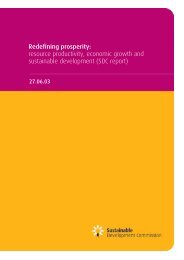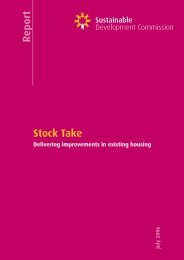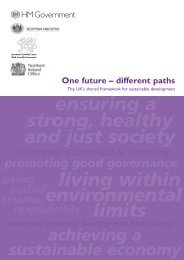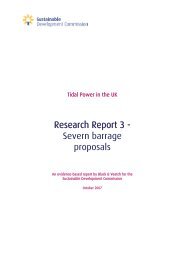Every Child's Future Matters - Sustainable Development Commission
Every Child's Future Matters - Sustainable Development Commission
Every Child's Future Matters - Sustainable Development Commission
Create successful ePaper yourself
Turn your PDF publications into a flip-book with our unique Google optimized e-Paper software.
Our approach<br />
The starting point of this project – which we<br />
have called <strong>Every</strong> Child’s <strong>Future</strong> <strong>Matters</strong> – is the<br />
perspective of children and their environmental<br />
needs. Academic evidence 7 and work with local<br />
authorities form the foundation of our conclusions<br />
and taken together with Securing the <strong>Future</strong> 8 and<br />
the Stern Review 9 they make a strong case for<br />
viewing <strong>Every</strong> Child <strong>Matters</strong> through a sustainable<br />
development lens.<br />
What is sustainable development?<br />
<strong>Sustainable</strong> development enables “all people<br />
throughout the world to satisfy their basic needs and<br />
enjoy a better quality of life, without compromising<br />
the quality of life of future generations”. 10 As is<br />
shown in Figure 1 five ‘guiding principles’ have<br />
been adopted by government to define the essential<br />
elements of sustainable development.<br />
In some areas, the links between children’s<br />
wellbeing and sustainable development are<br />
abundantly clear, for example in children’s health,<br />
participation in decision-making, and economic<br />
aspirations. But it is not immediately obvious how<br />
one of the two primary principles of sustainable<br />
development – living within environmental limits<br />
– connects with the ECM agenda. In order to better<br />
understand this link we commissioned two separate<br />
studies from The University of York and the new<br />
economics foundation (nef).<br />
We also invited practitioners from nine local<br />
authorities (one in each English region – see Annex<br />
1 for a list) to help us evaluate current practice and<br />
identify where the key opportunities for progress<br />
might lie. Two workshops were held over the course<br />
of the project; the period in between providing<br />
space for the practitioners to explore issues with<br />
colleagues and bring back their findings to the<br />
group. The issues raised by the practitioners’ group<br />
contributed to the nef study and have also informed<br />
this paper.<br />
Figure 1<br />
Five guiding principles of sustainable development<br />
Living within environmental limits<br />
Respecting the limits of the planet’s environment,<br />
resources and biodiversity – to improve our environment<br />
and ensure that the natural resources needed for life are<br />
unimpaired and remain so for future generations.<br />
Ensuring a strong, healthy and just society<br />
Meeting the diverse needs of all people in existing and<br />
future communities, promoting personal wellbeing, social<br />
cohesion and inclusion, and creating equal opportunity.<br />
Achieving a sustainable economy<br />
Building a strong, stable and sustainable<br />
economy which provides prosperity<br />
and opportunities for all, and in which<br />
environmental and social costs fall on those<br />
who impose them (polluter pays), and efficient<br />
resource use is incentivised.<br />
Using sound science responsibly<br />
Ensuring policy is developed and implemented<br />
on the basis of strong scientific evidence,<br />
whilst taking into account scientific uncertainty<br />
(through the precautionary principle) as well<br />
as public attitudes and values.<br />
Promoting good governance<br />
Actively promoting effective, participative<br />
systems of governance in all levels of<br />
society – engaging people’s creativity,<br />
energy and diversity.<br />
<strong>Every</strong> Child’s <strong>Future</strong> <strong>Matters</strong> 9








